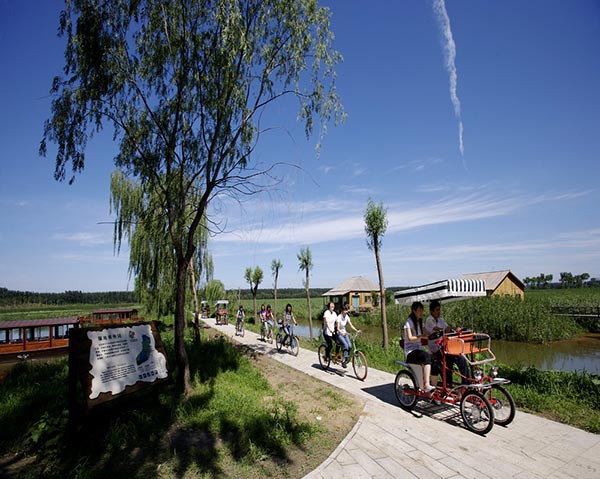A prescription to protect 'the Earth's kidneys'
 |
|
Boats with tourists at the Health Bridge Wetland Park in Beijing's Shunyi district. The park keeps tourism promotions to a minimum and restricts visitor numbers to protect the wetland. [Photo provided to China Daily] |
"If birds fly out of the reserve, we drive cars to direct the birds back in, like sheepdogs," Li says.
The trick is ensuring human interference is at best helpful and at least not harmful.
The NGO also hosts an encounter program in which adults and children learn how to identify flora and fauna, and record data about them.
They can then work the monitoring stations-making their own contributions to wetlands' protection.
Li and his colleagues fence off the areas beneath nests of the nationally protected black storks during the April breeding season to prevent human intrusion.
They place pork on mountains to prevent vultures from preying on villagers' sheep.
"Properly managed ecotourism supports, rather than strains, wetland protection," says Wang Lei, a researcher from the Science, Policy and Innovation Center of the World Wildlife Fund's Beijing office.
She suggests authorities consider wetlands' fluctuating capacities to accept visitors during different seasons when planning their tourism strategies.
One management problem nationwide is that different departments of the central and provincial or municipal governments are involved in managing wetlands, creating confusion, and the diffusion and overlapping of responsibility, she says.
The central government first proposed establishing a national-parks system in 2013.
China's National Development and Reform Commission signed agreements with the US-based Paulson Institute in June to explore new management models in scenic spots and heritage sites in Beijing and eight provinces.
Wang believes this is an innovative way to tackle the problems protective zones face, such as overlapping jurisdictions and divided land ownership.
Many successful cases overseas can be studied. The World Wildlife Fund is researching system-building methods in China.
The government's plan announced this year to integrate Beijing, Tianjin municipality and Hebei province into a conurbation provides new opportunities for wetlands.
Beijing will link its wetlands to those of Tianjin and Hebei's Langfang and Baoding by 2020, the capital's forestry bureau says.
About 3,000 hectares of wetlands will be created in Beijing's suburban areas adjacent to Tianjin and Baoding's suburbs.
Related:




















